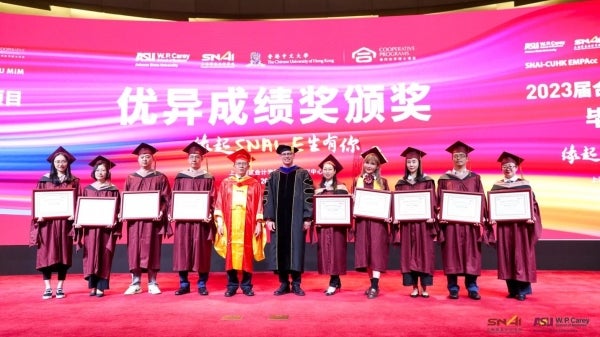Entrepreneurial spirit motivates ASU alumnus to advance innovative HIV test Idea

When Stephen Gamboa taught himself to play the recorder in the first grade, he earned a spot as the youngest student in the school’s recorder ensemble. Shifting his attention to percussion instruments, his childhood and most of his teen years were filled with lessons, practice sessions and involvement in every possible ensemble.
So it made perfect sense that he would go on to earn his bachelor’s degree in music.
But halfway through the program he began to think more deeply about his career path and the ways that he could make a difference in world.
“I always had a strong interest in civic engagement as well as science,” he said. “I decided that the health field, specifically public health, was something that interested me."
While he continued as a music major at ASU and stayed active on campus in the arts and student government, he started taking the required pre-med courses, and studied with Mayo Clinic as a pre-med scholar. There he engaged in labs and lectures, and shadowed physicians and nurses in their clinical environments.
He also sought out international public health opportunities between semesters, and funded his travels through an Indiegogo campaign.
“I traveled to Honduras and volunteered in the state hospital there and learned an immense amount about their health system and how many health disparities existed,” he said. “They have a rampant HIV epidemic.”
In public health, especially with vulnerable and marginalized communities, Gamboa had found a career path in need of his entrepreneurial spirit.
As a summer public health scholar at Columbia University, he studied health disparities, public health and epidemiology, and had an opportunity to prepare HIV prevention materials for local health care agencies.
His experience showed him that, while the field of public health is good at identifying and understanding population health problems, he wanted more.
“I wanted to be a person who can generate a solution to a health care problem,” he said.
That’s when he enrolled in ASU’s Master of Healthcare Innovation program, an online interdisciplinary graduate program that prepares students to lead transformation in health care with an emphasis on entrepreneurship, technology, innovation and policy-making.
Innovation is clearly Gamboa’s comfort zone, but it’s not always easy for business, he learned, even the business of health care.
“It’s hard for organizations to commit to innovation because they’ll need to change,” he said. “But we can slowly integrate elements of innovation that create change in our fractured health care system, and set the system up for progress and adaptability. Innovation can be a process.”
Gamboa’s final project in the MHI program, HIVSmart, gave him a chance to identify critical gaps in a process, and use startup thinking to solve a health problem at scale.
“HIVSmart is a product and service that provides an HIV test (mouth swab) with a corresponding smartphone application,” he said. “The HIV test plugs into a smartphone, and the user is able to view results along with HIV education, counseling, local resources and anonymous chatting.”
Gamboa found that something as simple as not knowing one’s HIV status is a barrier to changing the tide on HIV infection rates. If someone tests positive, he said, they can get the care they need. If their status is negative, they can make sure they stay that way.
But learning one’s HIV status can be a fearful and uncomfortable process for many, he said.
“The vision of HIVSmart is to provide people at risk for HIV with a way to test in the comfort of their home and to give them the necessary information so that they are well informed about their HIV status,” he said.
Gamboa refined his idea though the ASU Startup Accelerator, and was invited to present at the eighth annual Clinton Global Initiative University in Miami last year.
“Presenting my project at CGIU was an incredible and inspiring opportunity,” he said. “Not only was I able to receive feedback on how to refine my own idea, but I also learned things from other student entrepreneurs.”
Since graduating from the MHI program, Gamboa has raised more than $25,000 in seed funding for HIVSmart while preparing a patent application and looking into building a prototype. He’s also been busy in the policy arena.
“I became interested in health care policy when I took the health policy class in the MHI program, which is what motivated me to apply for and eventually get offered the Pedro Zamora Public Policy Fellowship at AIDS United,” he said.
AIDS United, a Washington, DC-based non-profit organization, provides strategic grant making, capacity building, technical assistance, and policy/advocacy for the HIV/AIDS community.
“In my role, I supported the policy team in federal level advocacy and policy efforts by attending briefings on Capitol Hill about issues that affect people living with HIV/AIDS, monitoring and tracking legislation, writing for the weekly Policy Update, and writing policy briefs.”
He also attended the President’s Advisory Council meeting on HIV/AIDS with White House staff and leaders, and learned about appropriations and how to secure funding for HIV/AIDS programs.
The fellowship helped him explore the federal policy world and clarified a career path that will help him bring together his ideas and contributions, past and present, once he completes his second master’s degree—this time in public health, which he began this fall at Columbia University.
Music will make an appearance in Gamboa’s next chapter as well. In addition to his studies and teaching courses in the MHI program, he is set to play in the percussion section of the Columbia University Medical Center student orchestra, and will audition for the Columbia University Orchestra in January.
“Many of the skills that are needed in health care policy and medicine I learned from music,” he said. “Music majors spend countless hours in a practice room by themselves just trying to play to the best of their ability, and it takes tremendous patience, determination and commitment. Those are skills that can help somebody in whatever they choose to do.”
More Business and entrepreneurship

ASU MBA ranked No. 1 in the US for entrepreneurship
In the Poets&Quants 2025 Best MBA Programs for Entrepreneurship ranking released today, the W. P. Carey School of Business at…

New ASU certificate to address veteran underemployment
Veterans and military spouses bring a wealth of talent to the corporate world. Unfortunately, human resources and…

ASU China Executive MBA ranked No. 7 in world by Financial Times
In the 2024 Financial Times rankings for Executive MBA (EMBA) programs, Arizona State University's W. P. Carey School of Business…